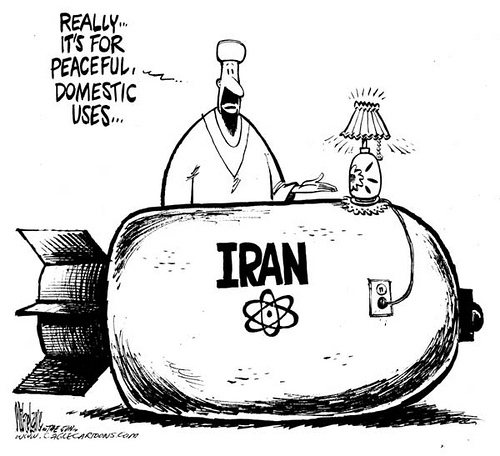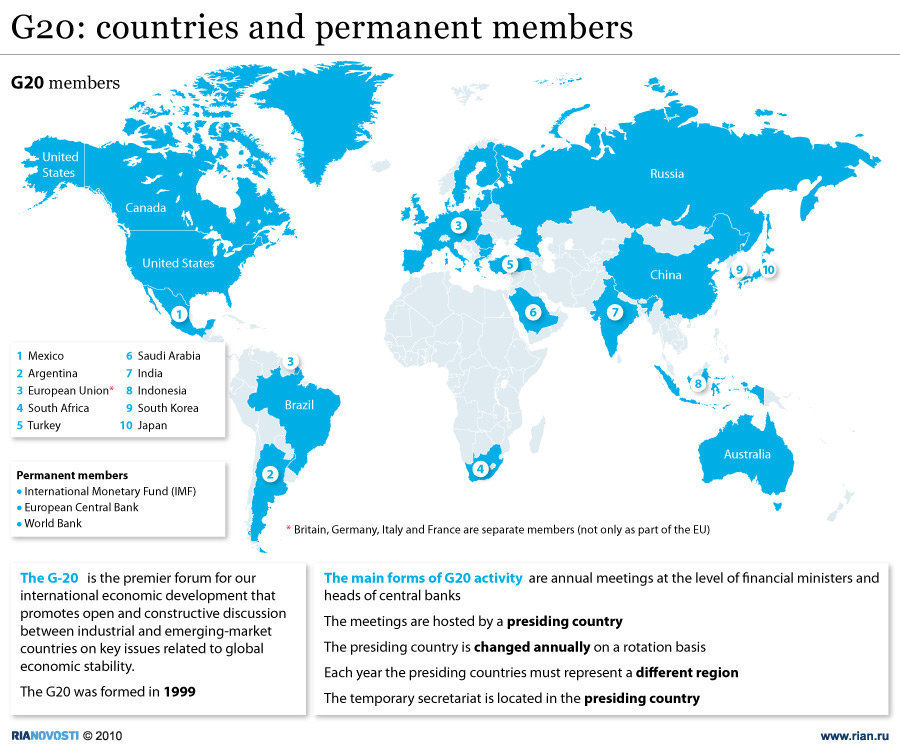Why Is Iran Not in the G20?

Please note that we are not authorised to provide any investment advice. The content on this page is for information purposes only.
25 April 2011.
For most countries, getting invited to a G-20 summit is like being invited to an exclusive party held by the most popular kids in school. Although everybody wants to attend the party, only the popular kids (the G-20 members) get to decide who are invited. In the G-20, these popular kids just happen to be the largest economies in the world.
25 April 2011.
For most countries, getting invited to a G-20 summit is like being invited to an exclusive party held by the most popular kids in school. Although everybody wants to attend the party, only the popular kids (the G-20 members) get to decide who are invited. In the G-20, these popular kids just happen to be the largest economies in the world.
There is a common misconception that G-20 members should be the twenty largest economies in the world. However the composition of the group has not changed since its inception in 1999. This has attracted controversy and criticism from the international community.
In an interview with Der Spiegel, a German weekly magazine, Norwegian Foreign Minister Jonas Gahr Støre described the G-20 as “one of the greatest setbacks since World War II.” According to Støre, the G-20 was a “self-appointed group” whose “composition was (is) determined by the major countries and powers”.
The organisation responded in a statement: “In a forum such as the G-20, it is particularly important for the number of countries involved to be restricted and fixed to ensure the effectiveness and continuity of its activity. There are no formal criteria for G-20 membership and the composition of the group has remained unchanged since it was established. In view of the objectives of the G-20, it was considered important that countries and regions of systemic significance for the international financial system be included. Aspects such as geographical balance and population representation also played a major part.”
Collectively, the G-20 represents approximately 90 percent of the world’s GNP, 80 percent of global trade, and two-thirds of the planet’s population. While there have been meetings among the G-20 members since 1999, the first official G-20 summit was only held in Washington D.C. in 2008.
Since then, G-20 summit participants have been limited to the member nations and any other nations and international organisations that have been invited by the members. Some of the nations that have been invited to a G-20 summit thus far include Spain, the Netherlands, Ethiopia, Malawi, Nigeria, Vietnam and Singapore.
In the upcoming G-20 summit to be held in Cannes, France from 3rd to 4th November 2011, the core members are once again expected to come together and discuss numerous economic issues alongside international organisations such as the IMF and the WTO plus a new batch of invited states. Among the invited states include recurring invitees such as Ethiopia, Singapore and Spain, while the United Arab Emirates and Equatorial Guinea are also expected to send representatives for their first ever G-20 summit.
However just like the guest list at any regular party, there is often as much discussion over those who weren’t invited to the party as those who were invited.
Source: RiaNovosti
Where’s Iran’s invite?
One of the more controversial absentees from the “guest list” to the G-20 summits is Iran.
Iran is one of the largest economies in the world coming in at 18th place according to GDP (PPP) and 29th place according to Nominal GDP (current prices, US dollars). Not only is this ranking higher than most of the invited states, but it also places them ahead of a number of G-20 permanent members such as Argentina, Saudi Arabia and South Africa.
Furthermore, Iran’s GDP (PPP) is expected to grow by 4.37 to 4.87 percent annually in the next five years and eventually break the US$1 trillion mark by 2015. The government of Iran has also recently implemented a five-year economic reform plan targeted towards becoming the 12th largest economy in the world by 2015.
Read Iran’s Economic Forecast on EconomyWatch.com.
Given Iran’s present and future economic standing, it is understandable why Iran may one day wish to be a part of the G-20 or at least be invited to a G-20 summit. However, the likelihood of either scenarios happening in the near future is probably as low as the chances of anyone from EconomyWatch.com being invited to a party at the Playboy Mansion.
While Iran may possess one of the largest economies in the world, its relative isolation from the international community dramatically diminishes any hope that its representatives may have of attending a G-20 summit. Just like at a regular party, those who are eventually invited to a G-20 summit often have a positive relationship with either the host nation or at least one of the G-20 permanent members. Iran on the other hand has neither.
In addition, the nuclear issue coupled with its recent altercations with the US and the UN has practically denied Iran any opportunity to re-establish itself in the international fold, let alone within the G-20. Having said that, despite Iran’s lack of diplomatic ties, it continues to assert a certain level of influence on the world’s economy. Iran’s oil and natural gas reserves, ranked 3rd and 2nd highest in the world respectively, coupled with its status in OPEC, makes Iran a key player in the world’s energy needs.
It is thus entirely conceivable for the G-20 to grant Iran access to the summit as a goodwill gesture akin to the one granted by the WTO to Iran back in 2005. However, any goodwill gesture by the G-20 is likely to require some concessions from the Iranian government as well, particularly in regards to its nuclear program. Ultimately while the G-20 may be focused on economic and financial issues, political factors will decide whether Iran will ever be invited to a G-20 summit.
Find out more about the G-20 and Iran’s economy on EconomyWatch.
Go to our Economic Statistics Database for more Iran Economic Statistics and Indicators.
Raymond Tham
EconomyWatch.com





